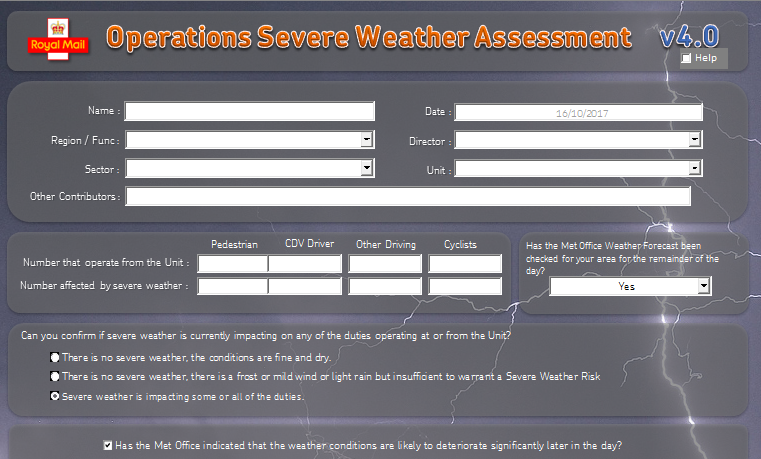How to deal with severe weather
During severe weather the challenge for managers is to ensure they provide the duty of care owed to our people while still maintaining service where it is safe to do so. The instructions below explain how to prepare for or respond to severe weather.
If appropriate also refer to the incident specific guidance on Flooding.
Preparing for Severe Weather
- Severe weather is not just about snow and ice it also includes flooding, fog, high winds, high temperatures and heavy rain.
- You must prepare for severe weather by maintaining a Preparation Checklist throughout the year and completing activities in the SHE Calendar. This will ensure that materials and arrangements are in place.
- You should monitor the weather at all times and use the Met Office website to keep updated. National and Regional communications will also alert you to any severe weather on the way so that you can plan accordingly.
- Create contingency plans to ensure you know what you will do when severe weather arrives.
- Supporting materials including the Severe Weather Standard, Severe Weather Risk Assessment and Preparation Checklists can be found on the SHE Knowledge Database.
Responding to Severe Weather
- In order to complete the Severe Weather Risk Assessment you first need to gather as much information as you can from as many different sources as possible e.g. Met Office, staff arriving on site, radio/TV etc.
- During severe weather the Severe Weather Risk assessment will guide you through all of the considerations you need to make in order to reduce the risk to an acceptable level. This should be completed with a Site Safety Rep wherever possible.

Communication
- It is essential that all of the risk assessment decisions and expected behaviours are effectively communicated to all involved. This should be completed by the use of WTLL or huddles.
- The decisions should also be communicated on the site Safety Noticeboard by way of a Notification Brief and posting the Severe Weather Risk Assessment.
- The plan in case of deteriorating conditions must also be communicated specifically how management will contact staff on delivery (e.g. phone, PDA message) and how staff can contact the office.
If in doubt at any stage always call Central Postal Control (CPC)
Central Postal Control deals with issues on a regular basis and will be able to talk you through how to deal with any situation.
